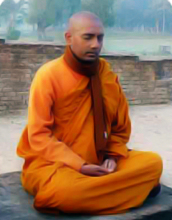What is meditation?
What is meditation?
 There are many things in life that are beyond our control. However, it is possible to take responsibility for our own states of mind – and to change them for the better. According to Buddhism this is the most important thing we can do, and Buddhism teaches that it is the only real antidote to our own personal sorrows and to the anxieties, fears, hatreds, and general confusions that beset the human condition.
There are many things in life that are beyond our control. However, it is possible to take responsibility for our own states of mind – and to change them for the better. According to Buddhism this is the most important thing we can do, and Buddhism teaches that it is the only real antidote to our own personal sorrows and to the anxieties, fears, hatreds, and general confusions that beset the human condition.
Meditation is a means of transforming the mind. Buddhist meditation practices are techniques that encourage and develop concentration, clarity, emotional positivity, and a calm seeing of the true nature of things. By engaging with a particular meditation practice you learn the patterns and habits of your mind, and the practice offers a means to cultivate new, more positive ways of being. With regular work and patience these nourishing, focused states of mind can deepen into profoundly peaceful and energized states of mind. Such experiences can have a transformative effect and can lead to a new understanding of life.
Over the millennia countless meditation practices have been developed in the Buddhist tradition. All of them may be described as ‘mind-trainings’, but they take many different approaches. The foundation of all of them, however, is the cultivation of a calm and positive state of mind.
Preparation
When you sit down to meditate you need to set up your meditation posture in a way that is relaxed but upright, usually sitting on a cushion and probably cross-legged. If this is not easy you can sit kneeling or else in a chair. Then you close your eyes, relax, and tune in to how you are feeling. It is important to be sensitive to your experience because this is what you work with in meditation. It is a good idea to take some time to sit quietly before starting a meditation, to slow down and relax. Some gentle stretching can also help.
